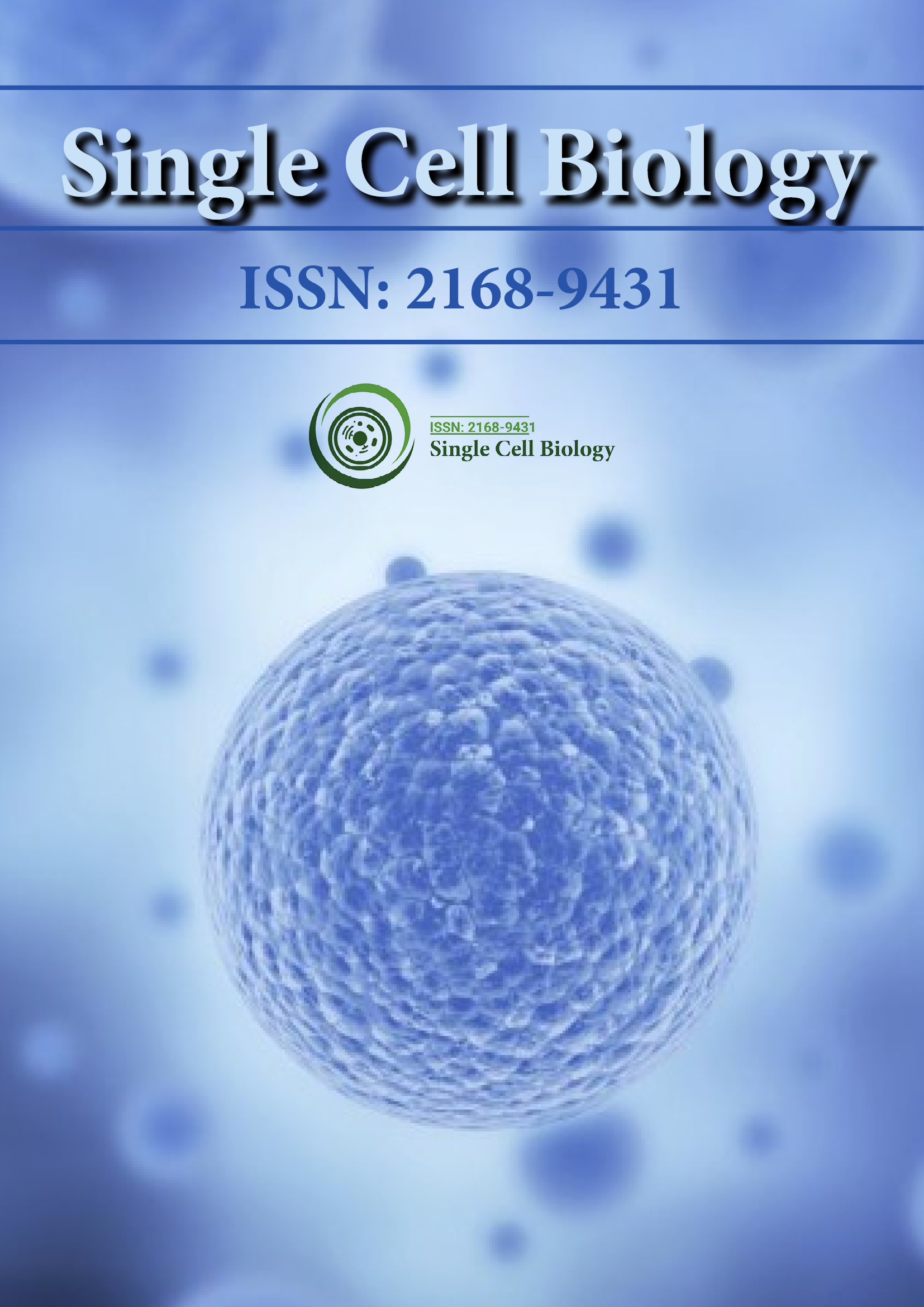Indexed In
- ResearchBible
- CiteFactor
- RefSeek
- Hamdard University
- EBSCO A-Z
- Publons
- Geneva Foundation for Medical Education and Research
- Euro Pub
- Google Scholar
Useful Links
Share This Page
Journal Flyer

Open Access Journals
- Agri and Aquaculture
- Biochemistry
- Bioinformatics & Systems Biology
- Business & Management
- Chemistry
- Clinical Sciences
- Engineering
- Food & Nutrition
- General Science
- Genetics & Molecular Biology
- Immunology & Microbiology
- Medical Sciences
- Neuroscience & Psychology
- Nursing & Health Care
- Pharmaceutical Sciences
Commentary - (2023) Volume 12, Issue 3
Tumor Heterogeneity: A Insights of Single-Cell Omics Analysis
Yaosheng Zhang*Received: 04-Sep-2023, Manuscript No. SCPM-23-23428; Editor assigned: 07-Sep-2023, Pre QC No. SCPM-23-23428 (PQ); Reviewed: 21-Sep-2023, QC No. SCPM-23-23428; Revised: 28-Sep-2023, Manuscript No. SCPM-23-23428 (R); Published: 05-Oct-2023, DOI: 10.35248/2168-9431.23.12.062
Description
Cancer, a complex and multifaceted disease, has long been recognized for its heterogeneity. Within a single tumor, there exist diverse populations of cells, each with distinct genetic and epigenetic profiles, leading to variations in cellular behaviors and responses to therapies. This heterogeneity poses a formidable challenge in cancer research and treatment, as it can result in treatment resistance and disease relapse. To address this challenge, scientists have turned to single-cell omics analysis, an innovative approach that enables the study of individual cells within a heterogeneous population. In this article, we explore how single-cell omics is revolutionizing our understanding of tumor heterogeneity.
The power of single-cell omics
Single-cell genomics: Single-cell genomics allows researchers to scrutinize the genetic makeup of individual cells within a tumor. Traditional bulk sequencing methods provide an averaged view of the genetic landscape, but single-cell genomics reveals the intricacies of genetic mutations, copy number variations, and clonal evolution within a tumor. This information is invaluable for tailoring targeted therapies to the specific genetic alterations present in different subpopulations of cancer cells.
Single-cell transcriptomics: Single-cell transcriptomics, on the other hand, sheds light on the gene expression profiles of individual cells. This technology has unearthed previously unrecognized cell types and subtypes within tumors and has uncovered insights into the functional states of these cells. It also provides a sight into the intricate regulatory networks that administer cancer cell behavior.
Single-cell epigenomics: Epigenetic modifications play a crucial role in cancer development and progression. Single-cell epigenomics allows us to investigate DNA methylation, histone modifications, and chromatin accessibility at a single-cell resolution. Understanding the epigenetic heterogeneity within tumors can offer insights into the plasticity of cancer cells and their response to environmental cues.
Tumor evolution and clonal dynamics
One of the most significant advantages of single-cell omics is its ability to resolve the evolutionary history of tumors. Tumors are not static entities but are constantly evolving due to genetic mutations and clonal selection. Single-cell genomics can track the lineage and clonal dynamics of cancer cells over time. This knowledge is pivotal for predicting the emergence of therapy- resistant clones and designing strategies to target them.
Intratumoral heterogeneity
Intratumoral heterogeneity refers to the diversity of cell types and states within a single tumor. Single-cell transcriptomics has revealed a staggering degree of heterogeneity in various cancer types. For instance, in breast cancer, single-cell analysis has identified distinct subpopulations of cancer stem cells, proliferative cells, and immune cells within the same tumor. Understanding this heterogeneity is crucial for devising combination therapies that target multiple cell types and pathways simultaneously.
Implications for personalized medicine
Single-cell omics has the potential to revolutionize personalized cancer therapy. By characterizing the unique genetic and molecular signatures of individual tumors, clinicians can tailor treatment regimens to the specific vulnerabilities of each patient's cancer. Precision medicine approaches are already benefiting from single-cell analysis, with the development of targeted therapies and immunotherapies that take into account tumor heterogeneity.
Overcoming challenges
While single-cell omics offers unprecedented insights into tumor heterogeneity, it comes with its own set of challenges. The high cost, technical complexities, and data analysis interference can be astounding. Moreover, the dissociation of tumor tissue into single cells may lead to the loss of spatial information. Researchers are actively working on addressing these challenges, developing more accessible technologies, and refining computational methods for analyzing single-cell data.
Applications beyond tumor heterogeneity
Single-cell omics is not limited to studying tumor heterogeneity. Its applications extend to various fields of biology, including developmental biology, neuroscience, and immunology. For instance, in developmental biology, it has helped uncover the molecular events that controls how cells are fated during embryogenesis. In neuroscience, it has revealed the range of neuronal cell types and their roles in brain function and disease.
Future scope
The field of single-cell omics is rapidly advancing, and its potential for deciphering tumor heterogeneity and other biological phenomena is boundless. Future research will likely focus on improving the accessibility and affordability of single-cell technologies, refining spatial transcriptomics techniques, and integrating multi-omics data for a comprehensive understanding of cancer biology.
Conclusion
Tumor heterogeneity is a formidable challenge in cancer research, but single-cell omics analysis is providing the tools to address the issue. By peering into the genetic, transcriptomic, and epigenetic intricacies of individual cells within tumors, researchers are gaining unprecedented insights into the drivers of cancer progression and therapy resistance. As this field continues to evolve, it holds potential of transforming cancer care, introducing in an era of precision medicine personalized to the unique characteristics of each patient's cancer.
Citation: Zhang Y (2023) Tumor Heterogeneity: A insights of single-cell omics analysis. Single Cell Biol. 12:062.
Copyright: © 2023 Zhang Y. This is an open-access article distributed under the terms of the Creative Commons Attribution License, which permits unrestricted use, distribution, and reproduction in any medium, provided the original author and source are credited.
